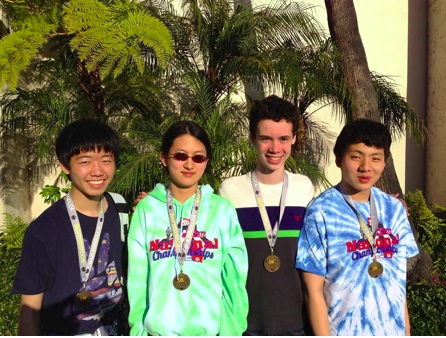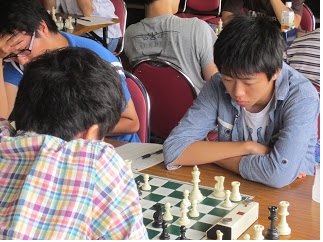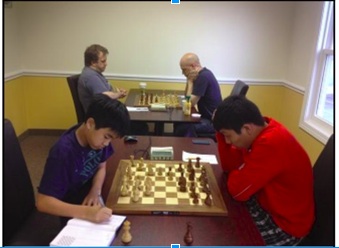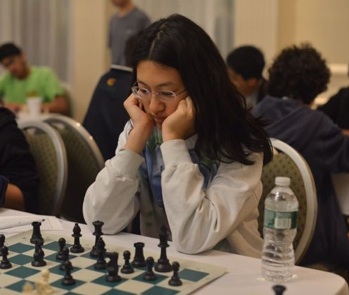SHS Chessmen Compete in National Tournament in San Diego
- Wednesday, 30 July 2014 11:30
- Last Updated: Friday, 01 August 2014 01:03
- Published: Wednesday, 30 July 2014 11:30
- Katharina Horn
- Hits: 11945
 Most are not aware that the game of chess is as competitively demanding and time consuming as any mainstream sport. The reality is that chess is more than a classic board game; in fact, those who play chess competitively and therefore have an ELO rating know that the game of chess entails practice and determination in addition to weekend-long tournaments and six-hour-long games. Junior Mahiro Abe, sophomore Eric Zhang, sophomore Dexin Li, and senior Morgan Lawless are the four players from Scarsdale High School's chess club who attended the 2014 National High School Championship in San Diego held in April. Although Scarsdale High School does not have a developed chess program with a dedicated chess coach like some High Schools do, these four players led the Scarsdale team to tie for 10th place out of 51 High Schools.
Most are not aware that the game of chess is as competitively demanding and time consuming as any mainstream sport. The reality is that chess is more than a classic board game; in fact, those who play chess competitively and therefore have an ELO rating know that the game of chess entails practice and determination in addition to weekend-long tournaments and six-hour-long games. Junior Mahiro Abe, sophomore Eric Zhang, sophomore Dexin Li, and senior Morgan Lawless are the four players from Scarsdale High School's chess club who attended the 2014 National High School Championship in San Diego held in April. Although Scarsdale High School does not have a developed chess program with a dedicated chess coach like some High Schools do, these four players led the Scarsdale team to tie for 10th place out of 51 High Schools.
These young players are all highly ranked on the ELO rating system, which accounts for all chess players, from Grandmasters, who have ELO ratings of 2600 and above, to beginners, who have ELO ratings closer to zero. ELO ratings are not rankings in which players are competing for specific place; there is no limit to how high a player's rating can go, though no grandmaster has yet achieved a rating of 3000. A player simply gains or loses points based on performance. Mahiro Abe has a rating of 2203 (Master level), Eric Zhang has a rating of 2084 (Expert level), Dexin Li has a rating of 1785, and Morgan Lawless has a rating of 1521. To give perspective, they all fall above the 96th percentile for chess players grades K-12 in the nation. Mahiro holds 21st place for all players age 16 in the nation, and Eric Zhang holds 30th place for all players age 15 in the nation. Needless to say, Scarsdale has talent as far as chess is concerned.
MAHIRO ABE
Regular rating: 2203
Junior ranking: 156 out of 39688
Age 16 ranking: 21 (only top 100 shown)
Mahiro started playing chess by chance, when he was taken in by the friendly environment of an after-school chess club he attended in second grade. Since then, he has filled his room with twenty to thirty chess books, and has recently become a Master, or a chess player with a rating above 2200.
He has also won first place in Japan's Chess Junior Championship, a tournament he is not likely to forget although he admits chess is not as competitive in Japan as it is in the United States. "I was traveling behind one person going into the fourth or fifth round. When I was paired with this person, I was in a bad position and down on time, but managed to turn the tables and win with a few really good moves that my opponent missed," explained Mahiro.
His prominence in Japan led him to represent Japan five times in the World Youth Chess Championships, an experience he says shaped the way he played chess and continues to play chess. "It's really cool that I got to meet a lot of people from different countries who have the same passion of playing chess," he said.
Mahiro's strengths are his impressive concentration and his strong base of fundamentals that stem from his extensive daily practice. "Even when it seems like the game is going to go on for another forty moves or something, I don't lose concentration," said Mahiro. He also has a bounty of diverse chess books. He tries to read a chapter a day; if he reads a chapter from one book on one day, he reads a chapter from another book the next day in order to vary the topic. He also has online lessons once a week, plays chess games on the internet, and watches top players' games. Once or twice a month, he attends an old and famous chess club in NYC called the Marshall Chess Club for a two-day tournament over the weekend. He plays four games, each around three to five hours long. Once or twice in a span of two to three months, he travels to Washington D.C., Philadelphia, and Massachusetts for larger tournaments.
Hard losses as well as gratifying wins and hard practice have shaped Mahiro's chess career. Around two years ago, when his rating was already over 2000, he was in a winning position and up a Knight against a kid who was only eleven years old. "I don't know how to explain it, it was like I just made him win," said Mahiro. "I couldn't get out of my seat for a few minutes after that loss. It was such a shock, it was so vivid. I remember it before every tournament. I'm confident I'll never make that kind of mistake again." After the tough loss, Mahiro became more cautious as a player in a good way.
One of the top points Mahiro has focused on this year is his determination to win the game and not settle for a draw. "Some players play for the draw if they are playing against a stronger opponent," admitted Mahiro. "Although that isn't necessarily bad, to keep playing chess you need that determination to win every game." Sometimes giving up is subtle - choosing a safe, inconsequential move over a more complicated one - so Mahiro has to work hard to avoid giving in to a tie. Perhaps his drive will lead him to surpass his title of Master, which he regards as a benchmark instead of an ultimate goal, and to achieve the title of Senior master, which is the title just before Grandmaster.
Mahiro guesses that he has spent more time on chess than any other extracurricular activity in his life ... and he hopes to keep it that way. Although he humbly expresses doubt that he can play for a college that is a "chess stronghouse," he hopes to play at least a few tournaments every few months as he gets older regardless. "I'm really determined to win, but even if I don't win, playing good chess makes me really happy," explained Mahiro, "I see no reason at all to quit."
ERIC ZHANG
Regular rating: 2084
Junior ranking: 357 out of 39688
Age 15 ranking: 30 (only top 100 shown)
Eric Zhang is not the typical chess player. Although he describes his practice as minimal, he has an undeniable love for the game and "plays with his heart." And while his coach used to tell him to sit upright and focused when playing tournaments, he is a fan of Grandmaster Magnus Carlsen, who sits in awkward and nonchalant positions. Perhaps the most unique aspect of Zhang is his almost superstitious belief in chess destiny. "Most players study a lot, but I rely on my passion and my destiny," noted Zhang. "When I start out with a win, I know I'm going to have a good tournament, and I believe that nothing is going to stop me. When I have a bad start, I know I'm going to have a bad tournament, so I let it happen and look forward to the next one."
From the time he started learning the basics of chess at five years old and playing competitively two years later, Zhang's unique approach has certainly worked for him. He has achieved the Expert level and is 100 points shy of Master, his next goal. His most memorable tournament was the time he placed 9th out of 200 kids age 14 in the 2013 Junior National Championship held in Florida. He has traveled as far as Florida, Virginia, and Philadelphia to attend tournaments.
Although he identifies his weakness as his game openings, which need to be studied, he has a useful ability to function under pressure. In tournaments where there is an unbearable silence except for the touch of clocks, which serve to keep the time for players who lose the game if they run out of time, functioning under pressure, especially time pressure, is essential. "For me, that kind of pressure is really fun," said Zhang.
Zhang's love of the game is almost palpable. "Chess has helped me in countless ways. It makes me feel special, it gives me confidence. I relate chess to everything I do in life - I know that I may lose a few games or have a bad day, but it's important to focus on the next game or to have a better day the next day," he said. Clearly, he plans to play for the rest of his life.
DEXIN LI
Regular rating: 1785
Junior ranking: 1444 out of 39,688
Dexin Li is a girl in a predominantly male sport that is not split by gender. Thus it is fitting that her mentor and idol has been her coach Rusa, who was the US Women's Champion in 2005. Rusa has pushed Li, who struggles with confidence problems, to not only better her strategies, but also believe in herself.
One of Li's most memorable tournaments was the New York State Scholastic Championships, where she broke 1400. "I remember in the last game I played really hard, and my face was all red," Li recalls. Like many serious players, Li gets emotionally invested in her tournaments, which makes her wins even more gratifying.
She is planning to increase the number of tournaments she plays in order to break 2000 and earn the Expert title. She will do so using her ability to concentrate for long periods of time as well her strategy of waiting until the middle of the game to start attacking her opponent to gain an advantage. If she keeps up her practice, which includes weekly meetings with Rusa, reading tactic books, and going over her games on a computer program called Test Base, Li will certainly reach her goal.
MORGAN LAWLESS
Regular ranking: 1521
Junior ranking: 2971 out of 39,688
Morgan Lawless was introduced to chess in first grade. Since then, his parents have been the perfect kind of parents: supportive, but not pushy. "My dad always tells me the second you stop having fun is the second we're going to stop going to these tournaments," said Morgan. Lawless has developed into a player who genuinely has fun playing.
Schoolwork often gets in the way of Lawless's practice. However, he manages to attend group chess lessons on a weekly basis and study tactic books when he has the chance. He also uses the ICC (Internet Chess Club) and chess.com to play against different people online. He attends local tournaments at the National Scholastic Chess Foundation in Westchester.
Lawless's chess strategy is marked by his desire to try unconventional, fun moves. "I like to do risky, stupid things that other people would say, 'You shouldn't be doing that,'" said Lawless. "But I like to use them because those moves are really fun." Perhaps that is why his favorite Grandmaster is Nakamura, whose aggressive play is entertaining to watch.
As Lawless's coach used to say, "The hardest thing to do in chess is win a won chess game." In other words, converting one's advantage into a win is more difficult than it seems for Lawless and other competitive chess players. Lawless is also hoping to work on studying more tactics, so that he can calculate possibilities with a clearer and quicker mind.
He plans to play chess for the rest of his life, whether it is in tournaments or just for fun. "Chess is an extracurricular that I've always done and I absolutely love it. Winning a chess game is the best thing ever because you feel like you've earned it; after sitting there for hours and hours, finally winning feels really good."






